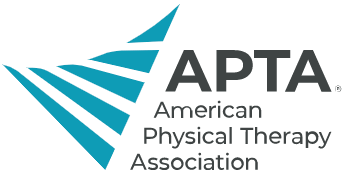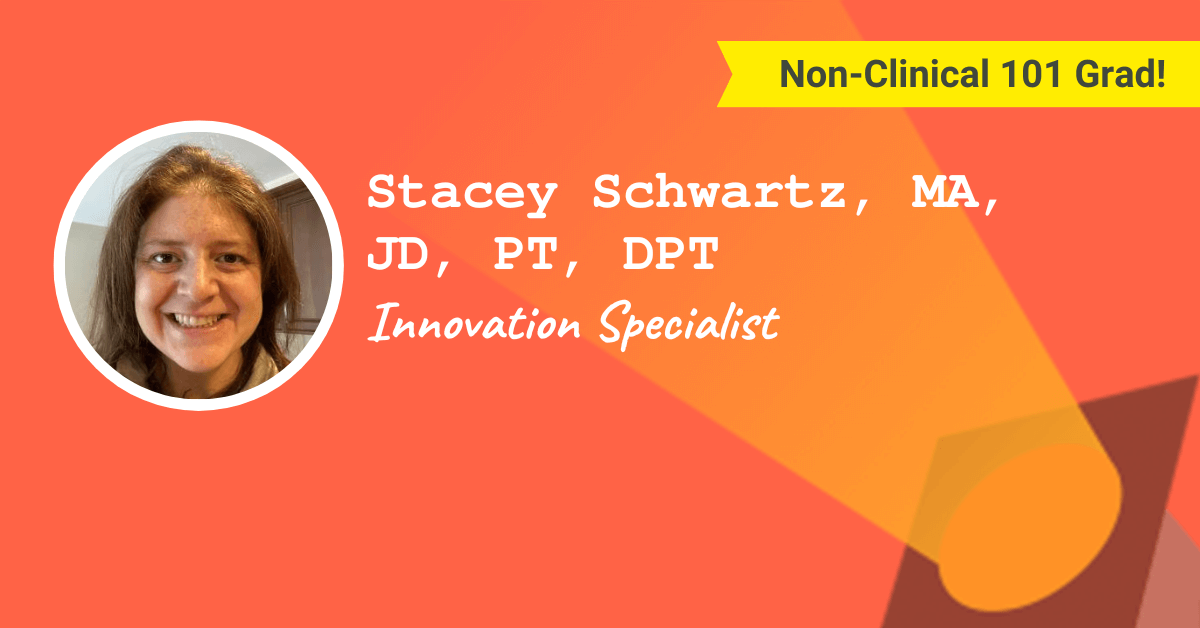This week’s spotlight is on Stacey Schwartz, MA, JD, PT, DPT, a Non-Clinical 101 graduate who is now Innovation Specialist for the APTA!
This post may contain affiliate links or codes. This won’t increase your cost, but it helps keep TNCPT alive, and free of annoying ads! Thank you for your support. 🙂
What is your full name, title, and company name for your current, primary role?
Stacey Schwartz, MA, JD, PT, DPT — Innovation Specialist at the American Physical Therapy Association (APTA)

Where are you located?
Alexandria, VA.
Where did you go to PT school, and what year did you graduate?
New York Medical College, 2016.
Please refrain from contacting our spotlight participants on social media. There are thousands of readers just like you out there. 🙂 Please ask your questions in the comments on this blog post.
If you’re a Non-Clinical 101 student, you can network with many of our spotlight participants in the alumni groups!
What did you do when you first finished school, and for how long?
I worked in a big clinic for three years, a small clinic for one year, and opened my own clinic during Covid inside my CrossFit gym (shoutout to Foundation CrossFit in Seattle!). My last clinical job was at a big hospital system doing both acute care and outpatient ortho.
In what setting(s) did you work, and what types of patients did you treat?
I worked in outpatient ortho, sports, and acute care.
What did you enjoy about your early roles? What didn’t you enjoy?
I loved learning new things and being a part of a team with my patients and coworkers. I didn’t love the pressure to see more and more patients.
When and why did you decide to do something non-clinical?
About three years into practicing, I wanted to do something that could have a larger impact on the profession overall.
What are you doing these days?
I work full time at APTA as an Innovation Specialist.
Are you still treating patients, or are you solely non-clinical?
I am solely non-clinical.
How long have you been in your current role?
Since July 2022.
Did you get any special certifications or training along the way to help you get into your current role?
I took Non-Clinical 101, of course!
I think the importance of listing and explaining all skills that I have attained throughout the totality of my education and career made a difference in the application process.
How did you find your job? Did you apply or find it through a connection?
I found my job through networking—requests for informational interviews, LinkedIn messages, and chatting with friends and coworkers.
Did you do anything special to your resume and cover letter to land the job?
I tailored my resume and cover letter per Non-Clinical 101’s advice!
What was the interview like for the innovation specialist role?
I met with various people throughout the organization to get a feel for how everyone really collaborates.
How have people reacted to you leaving patient care?
Most people are excited because they see that I am involved in working to advance the profession every day.
What’s a typical day or week in the life like for you? What types of tasks and responsibilities fill your time?
I spend a lot of time learning about novel issues and ideas affecting physical therapy—from how to properly screen patients for anxiety to how artificial intelligence (AI) might affect and improve our profession.
Innovation does not have to be technology related. I love learning about clinicians that use cost-effective or simple measures to improve their treatments or clinics.
What are some of the rewards of your role? What are the biggest challenges?
One of the rewards is learning about ways to help our members and clinicians and disseminating those ideas.
Some people are slow to adopt new ideas, which can be a challenge.
How did your clinical background prepare you for this role? Which skills transferred?
I need to be able to speak in clinical terms on a daily basis. I have a strong writing and research background, which has been invaluable when drafting reports and memos.
What type of person do you think would do well in your innovation specialist role?
The type of person who would do well in this role is someone who is interested in what is next for the profession. They would be able to articulate why an idea or invention would or would not be helpful for members. There is a lot of interfacing with members in my role, so they would also enjoy networking with other physical therapists.
Do you work remotely, onsite, or hybrid?
Hybrid, which is really great.
Does your organization hire PT, OT, or SLP professionals into non-clinical roles? If so, what type of roles?
In some roles at APTA, it is necessary to have that clinical background. For example, I work in the Practice Department, and we get a lot of questions about…practice 🙂
Did you read any books, take any courses, or do anything special overall to get you where you are today?
The books that have really helped me in terms of my career are:
What is a typical career path for someone in your innovation specialist role?
A typical career path for someone in my role would be spending time working as a PT and getting a deep understanding of the profession. This includes anticipating the needs of clinicians and developing a passion to improve the field.
What is next for you? What are your high-level career aspirations?
I hope to continue pursuing innovation in PT.
APTA holds a Future of Rehabilitation Summit that I would like to see occur every year and turn it into something that clinicians cannot wait to attend.
We have some compelling programs and projects coming in 2024 and 2025, which I’m excited to implement and share with members!
What would you recommend to someone who is considering going into a role like yours? Do you have any special words of wisdom for the readers?
Network, and read everything you can about PT and innovation!





